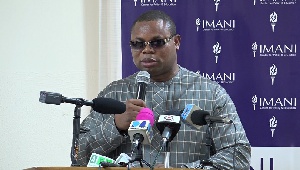The Ghana Union of Traders Associations (GUTA) has issued a stern warning to government, saying the proposed 17.5 percent Value Added Tax (VAT) on mobile phones should not be introduced.
It also warns that the new formula by Customs for calculating duties on imported cables must be reversed.
The warning comes in the wake of government’s decision to impose a 17.5 percent VAT on imported mobile phones in a move to increase revenue.
The National Welfare Chairman of GUTA, Benjamin Yeboah, told B&FT that the 17.5 percent VAT is coming at a time when mobile phones dealers are already battling with a 10 percent tax that was slapped on their business by the ECOWAS Common External Tariff (CET) regime.
“Now, what is happening in the mobile phone market is that introduction of the ECOWAS CET slapped 10 percent levies on their business, which we complained about and nothing was done. And just recently, we were told that some 17.5 percent VAT is also going to be added.
“We feel that is very harsh, because it is going to make phones expensive. So, we have met with the Deputy Minister of Finance and presented our case to him. He said the ministry will look at it and give us feedback by end of the week,” he said.
What it means is that taxes on mobile phones will now rise to 27.5 percent, which will definitely be transferred to the final consumer.
Economist Dr. Ebo Turkson of the University of Ghana agrees with GUTA, and argues that any additional taxes could lead to hikes in mobile phone prices – which may impede financial inclusion.
“What we should be very mindful of is that mobile money is very important for the economy because we are able to raise a lot of resources out of that; otherwise people would have been keeping the monies in their wallets or elsewhere.
“But if they are storing money on their phones, the resources are available for us to dwell on them. So, in as much as the sector is booming, it becomes an attractive sector for government to impose taxes and get revenue. It must be careful it does not unnecessarily make the services that are provided within that sector too expensive,” Dr. Turkson told Accra-based Citi FM.
Another issue the association has raised is the new formula adopted by the Customs Division of the GRA at the ports, for calculating the amount of duty traders pay on the imported cables.
According to Mr. Yeboah, rather than calculate the duty by using length of the cables, Customs has adopted a new calculation method of using weights – which has led to a more than 100 percent increment in the duty.
“Secondly, our sector that imports cables also has issues. Duties on cables have always been calculated based on the length (in metres), but now Customs is telling us that it is going to calculate it based on weight of the cables.
“So, they used it, and it shot the values very high. In fact, our members say the amount has more than doubled what they used to pay,” he said.
Business News of Wednesday, 21 March 2018
Source: thebftonline.com













